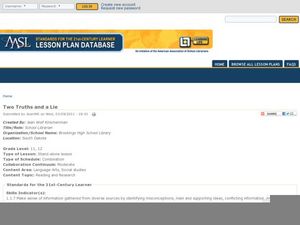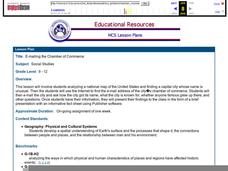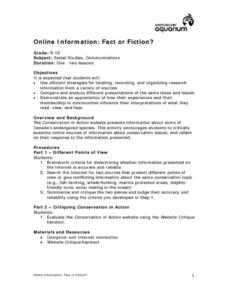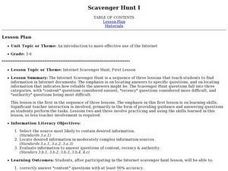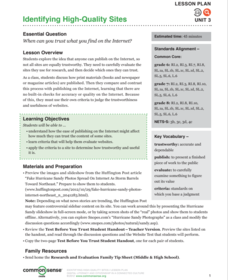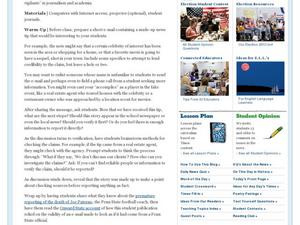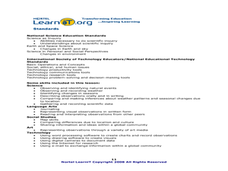Curated OER
How to Locate and Evaluate Information, Part III - Internet Sites
This is the third in a series of lessons scaffolding the research paper. It purports to teach researchers how to evaluate internet sites, but the lack of links, specific criteria, or site evaluation rubrics would require additional...
TED-Ed
How to Choose Your News
How do you get the truth unfiltered by middlemen? Tune into various sources and note the differences is the suggestion in a short video that begins by providing examples of how media gatekeepers have manipulated information and how those...
Code.org
Sending Binary Messages with the Internet Simulator
Show your class how to develop a protocol to solve a problem. Pupils then continue with working with binary messages but refine a protocol to assist with the distinction of individual bits by including a bit rate. Finally, the pairs use...
Curated OER
Two Truths and a Lie: Internet Research Skills
It's tough for high schoolers to assess what is a credible resource and what is not. A helpful resource prompts class members to research a particular topic and record two facts—and create one lie—while documenting the sources. They then...
Curated OER
E-mailing the Chamber of Commerce
Encourage effective internet research and e-mail correspondence as scholars investigate a US capital city they've never visited to find pertinent and relevant information. They begin by picking a city, then visit that city's chamber of...
Curated OER
Online Information: Fact or Fiction
Discuss ways to determine if the information middle and high schoolers gather online is accurate. Using the Internet, they cite two sources that show conflicting points of view on a subtopic of conservation. They summarize and analyze...
EngageNY
Gathering Information about Screen Time: Assessing and Reading Internet Sources, Day 1
What's the best way to evaluate a source's accuracy and credibility? Pupils discuss the question with a partner and then share their ideas with the class. They also conduct Internet research, looking for an article that answers a chosen...
EngageNY
Gathering Information about Water Management: Assessing and Reading Internet Sources, Day 2
Accuracy, credibility, timeliness ... it's time to act on source reliability! Pupils continue conducting Internet research, selecting two questions about water management from their researcher's notebooks that they want to explore...
Curated OER
Internet Scavenger Hunt: Lesson 1
Students participate in an Internet scavenger hunt in order to find information in Internet documents. Students work in groups to try to locate answers to specific questions, and must determine how reliable the answers might by rating...
Common Sense Media
Identifying High-Quality Sites
Use a Huffington Post article focused on false pictures of Hurricane Sandy to launch a discussion about the reliability of online information. Groups compare and contrast how print and broadcast media regulate data gathering with the...
Newseum
When the News Media Make Mistakes
Mistakes happen. When they happen in news reporting, be it in print or on the internet, journalism ethics requires that the errors be corrected. Young journalists use an Accuracy Checklist to track how news organizations post corrections...
Curated OER
Check It Out: Verifying Information and Sources in News Coverage
If it’s in the news it must be true, right? Prompted by a New York Times article, class members consider the importance of accuracy in reporting and validating sources. The detailed plan includes warm-up exercises, discussion questions,...
Curated OER
Taming the Wild Wiki
Take a look at the credibility of online sources such as Wikipedia. Discussion points and handouts are included to facilitate a meaningful and informative dialogue. Tips are given on how to determine if a Wikipedia article is reliable...
Curated OER
Explorit's Computing and Internet History Quiz
In this online interactive computing and Internet history quiz worksheet, students respond to 10 questions. Students may check their answers to checked for accuracy.
Curated OER
Web of Deceit
Check the validity of Internet web sites analyzing the accuracy of the information. Students will use this knowledge to create their own web site about a person of their choosing.
Curated OER
ETHICAL USE OF THE INTERNET
Students investigate the use of the internet and how it should be used by students. The concepts of intellectual property and fair usage are covered. The author of resources is found by them through practice with finding small print...
Media Smarts
Hoax? Scholarly Research? Personal Opinion?
Divide your class into groups to study the validity of online sources. One group looks at the authority and accuracy of four listed websites, another group looks at advocacy and objectivity, and the third group looks at currency and...
Curated OER
Digital Curation: Life and Times of Mark Twain
By digitally organizing research, your class leaves a legacy for future students on the life and times of Mark Twain. Before reading The Adventures of Tom Sawyer, scholars conduct group research projects on one of six (listed) topics....
Curated OER
Strategic Skill: Evaluating Information Quality Using Electronic Sources
Fourth graders review and complete evaluating information quality. In groups, they research the diversity of the numerous Native American tribes in Montana. They complete a worksheet on evaluating sources on the Internet and share...
Curated OER
Historical Locations of The Civil Rights Movement
A geographic perspective helps historians learn about significant eras such as the civil rights movement. Through research and source analysis, learners create a report depicting a significant location of this time. They synthesize their...
Curated OER
Christmas Shopping on the Internet
Young scholars utilize the Internet as a research tool as they "shop" on the Internet for a list of Christmas gifts. In groups, they compare prices, shop for the best price and make sure to spend no more than $300.
Curated OER
Significant What?
Students define accuracy and precision, and differentiate between the two terms, apply the concepts of accuracy and precision to a given situation and correctly apply the concept of significant figures to measurement and mathematical...
Curated OER
The Need to Evaluate
Students access 3 Internet sites. They examine the need to question information found on the Internet and research a question using the Internet. They study discrepancies among Web sites and brainstorm indicators that determine a Web...
Curated OER
Veteran's Day Activities
Fifth graders research websites to gather information about Veteran's Day to develop a quality school wide Veteran's Day Program and classroom group presentation.





